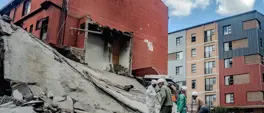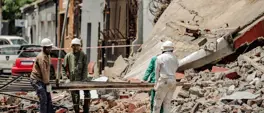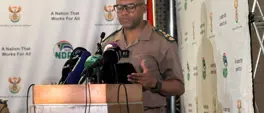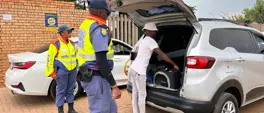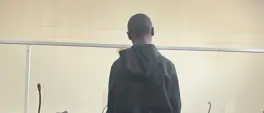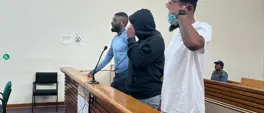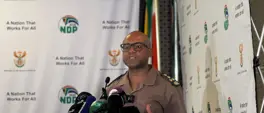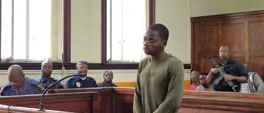What to know about Sarajevo's 'sniper safari' claims
AFP
18 November 2025 | 17:18For those in the Bosnian capital, it reopened old wounds from the 1,425-day blockade that saw its streets become a killing ground, and resurfaced dark claims about wealthy killers paying to shoot them for amusement.
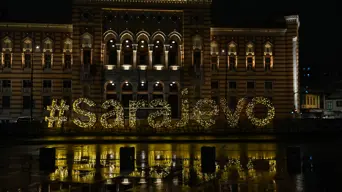
An illuminated sign reading '#Sarajevo' stands in front of the city's current city hall in Sarajevo, Bosnia and Herzegovina, in February 2025. This year marks the 30th anniversary of the end of the war; the 30th anniversary of the end of the siege of Sarajevo will be celebrated in February 2026. Picture: Adrien Fillon / NurPhoto / NurPhoto via AFP
SARAJEVO, BOSNIA AND HERZEGOVINA - Italian investigators last week reportedly opened a probe into decades-old allegations that foreigners paid to shoot civilians on a "sniper safari" during Sarajevo's siege in the 1990s.
For those in the Bosnian capital, it reopened old wounds from the 1,425-day blockade that saw its streets become a killing ground, and resurfaced dark claims about wealthy killers paying to shoot them for amusement.
The Bosnian judiciary, which opened its own probe years earlier, says it is still verifying the allegations, and details in the current investigation remain scarce.
Here is what we know about the harrowing claims of the so-called "weekend snipers" during the war that killed more than 100,000 people and left Bosnia and Herzegovina deeply scarred.
THE SIEGE
In early April 1992, Bosnian Serb forces encircled Sarajevo, starting what would become the most prolonged siege in modern European history.
Over the next four years, more than 11,500 people were killed in the city, including several hundred children, according to official Bosnian data.
Many were shot by snipers, positioned on hills surrounding the city.
The Hague war-crimes tribunal found that the sniper campaign had a single aim — to terrorise Sarajevo's civilians.
However, no individual sniper was ever held accountable, with all convictions directed toward the commanders in charge.
'SNIPER SAFARI'
The first report of the "sniper safari" emerged while the city was still under siege, published in the Sarajevo daily Oslobodjenje.
The front page of April 1, 1995, ran the headline "Sniper safari in Sarajevo".
Beneath it were the lines "Chilling testimonies of war tourism" and "A Serbian officer offered an Italian journalist the chance to shoot at an elderly woman".
Another read: "They prefer to shoot at children".
The article cited Italian media reporting testimonies about "weekend warfare in Sarajevo", as well as claims raised before the People's Court in Trento.
No charges or criminal investigation were launched following the report but Bosnian intelligence reportedly alerted heir Italian counterparts.
It would be decades before the allegations resurfaced.
THE DOCUMENTARY
In 2022, Sarajevo's mayor, Benjamina Karic, who had been a young child during the war, watched a documentary that shocked her.
Within days of watching the film "Sarajevo Safari" by Slovenian director Miran Zupanic, which aired at a festival in the city, she filed a criminal complaint with Bosnian state prosecutors, and then later with the Italian authorities.
In the film and subsequent interviews, former Bosnia and Herzegovina army intelligence officer Edin Subasic said he had first heard claims about paid sniper shoots from a captured prisoner during the war in 1993.
Subasic, writing in radiosarajevo earlier this week, said he had come across notes from the interrogation with a Serb national who claimed Italian hunters had travelled with Serbian volunteers near Sarajevo.
"They are rich men who will pay the Serb forces in Sarajevo to let them shoot at some Muslims," Subasic said.
Following Karic's complaint in 2022, the Bosnian prosecutor opened a preliminary investigation, but no further details followed.
A NEW INVESTIGATION
This August, Karic filed an updated complaint with the Italian courts through their embassy in Sarajevo.
Former judge Guido Salvini, who helped journalist Ezio Gavazzeni build the case, told Italian media that "a considerable amount of work has been done," largely by Gavazzeni, "drawing on local sources and witnesses from both sides".
Salvini said they had also obtained documents from the Italian intelligence, which had officers in Sarajevo during the siege.
"A whole team of dedicated people is working to ensure that the complaint does not remain just words on paper," Karic wrote on Facebook.
"We are not giving up!" she added.
The Milan prosecutor's office has not disclosed at what stage the case is at nor responded to AFP's requests for information.
Get the whole picture 💡
Take a look at the topic timeline for all related articles.


